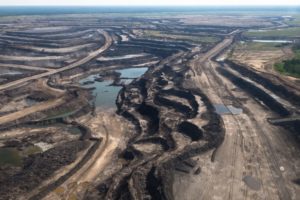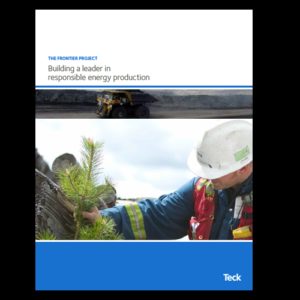On February 23, 2020, Vancouver, B.C.-based Teck Resources Limited announced its withdrawal of the Frontier Project from the regulatory review process. The company will not proceed with the building of a massive oil sands project in northern Alberta, citing the ongoing debate over climate policy in Canada.
The federal government was expected to decide this week on whether to approve the $20.6 billion, 260,000-barrel-per-day project. The company said it will take a $1.13 billion writedown, which it estimated would have created 7,000 construction jobs, 2,500 operating jobs, and brought in more than $70 billion in government revenue.
The project was also expected to produce about four million tonnes of greenhouse gas (GHG) emissions per year over its 40 year lifespan, and disturb 292 square kilometres of wetlands and boreal forest. In addition, the project was expected to impact several Indigenous communities, which were consulted in the early stages of the project since 2008.
A total of 14 First Nations and Metis communities signed participation agreements with the company on the mine. However, Bill Loutitt, CEO of McMurray Metis, said while his community supported the application, the decision to withdraw was the correct one and was in the best interest of Canadians.
The project was awaiting approval from the federal government, which had been expected by the end of the month. Minister of Environment and climate Change Jonathon Wilkinson has been indicating for weeks that cabinet’s discussion would include the issue that Alberta has not set specific GHG emissions reductions targets to enforce its cap on emissions from the oil sands.
“This is a clear win for the climate, diffusing a carbon bomb that would have seen Canada adding an extra 6 MT of emissions per year for the next forty years – making it impossible for Canada to reach net zero emissions in 2050,” said Catherine Abreu, executive director of the Climate Action Network Canada.
 Oil Sands image from The Narwhal, by Louis Bockner of Sierra Club BC.
Oil Sands image from The Narwhal, by Louis Bockner of Sierra Club BC.
Others claim that the cancellation was for economic purposes. A January report from the Institute for Energy Economics and Financial Analysis (IEEFA) made the case that Teck’s application showed a “reckless disregard for the facts regarding oil prices in Canada.” According to the IEEFA, the interim permit approval was based on a poorly supported price estimate that ignored forecasts from the Canadian Energy Regulator, the World Bank, the International Monetary Fund, and oil and gas industry groups. A joint-review panel relied on a long-term oil price projection of more than $95 US per barrel provided by Teck, about $40 US higher than current prices and around $20 US higher than some other forecasts.
Furthermore, on February 21, Teck released disappointing fourth quarter results, explaining that global economic uncertainty negatively impacted commodity prices.
Don Lindsay, president and chief executive officer of Teck provided some key points in his announcement to cancel the project, including the following:
- At Teck, we believe deeply in the need to address climate change and believe that Canada has an important role to play globally as a responsible supplier of natural resources. We support strong actions to enable the transition to a low carbon future. We are also strong supporters of Canada’s action on carbon pricing and other climate policies such as legislated caps for oil sands emissions.
- The promise of Canada’s potential will not be realized until governments can reach agreement around how climate policy considerations will be addressed in the context of future responsible energy sector development. Without clarity on this critical question, the situation that has faced Frontier will be faced by future projects and it will be very difficult to attract future investment, either domestic or foreign.
- Teck has not taken this decision lightly. It is our hope that the decision to withdraw will help to create both the space and impetus needed for this critical discussion to take place for the benefit of all Canadians.
Following Teck’s decision, Minister Wilkinson and Minister of Natural Resources Seamus O’Regan released a joint statement that included the following:
- Important parts of Canada’s economy have been built on our natural resource sector and the workers across the country who have powered it for generations. Our government is committed to developing our natural resources sustainably and to creating good, middle class jobs. A strong economy and clean environment must go hand in hand.
- As Teck has rightly pointed out, and as many in the industry know, global investors and consumers are increasingly looking for the cleanest products available and sustainable resource development.
- We agree with Teck and leading industry groups that all orders of government need a real plan for climate action now and to reach a net zero economy by 2050.
- Canada will stay competitive in the global economy if our industries continue innovating with the best technologies in the world and if governments work together on a serious plan to protect the environment.
- We also recognize Teck’s leading class consultation work on this project, including their efforts to engage with local Indigenous communities throughout the project development and review process. Teck’s consultation model is a positive example for future proponents.
For further information on the background of the Teck Resources project, click here.
Featured image from IEEFA and project report image from Teck.










